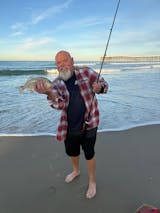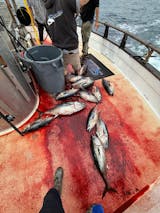What Causes It—and Fluorocarbon Memory: What Causes It—and How to Fix It
You unspool a new 30 lb leader and it snaps into tight coils like a Slinky. You stretch it, curse it, maybe even ditch it. Sound familiar?
Fluorocarbon memory isn’t just annoying — it ruins presentations, causes tangles, and can cost you bites.
But memory isn’t random. It’s a direct result of how the line is made. And Opsin’s slow-extrusion process is built to beat it.
Let’s break it down: what causes fluorocarbon to coil, and how to fix it for good.
Why Fluorocarbon Coils in the First Place
Fluorocarbon memory is the line’s tendency to retain the shape of the spool. When you peel it off, it springs into loops instead of laying straight.
That’s a problem when you’re tying clean knots or trying to present a bait naturally.
Memory hits hardest in heavier line classes — especially 25–40 lb — because of the line’s thickness and stiffness.
But the real cause is deeper: it’s about extrusion speed and how the resin cools.
Most fluoro is pushed out of machines fast and wound tight while still warm. That locks in the coil.
Once it sits on a spool for months (or years), it gets worse.
The result? Line that loops off your reel, tangles on the deck, and kinks mid-cast.
And every one of those coils affects how your bait swims and how your knots cinch.
Memory isn’t just cosmetic — it affects performance.
The Fix: Slowing Down the Process
Memory doesn’t have to be part of the deal. Not if you fix it at the source.
Opsin is slow-extruded in Japan — meaning the line is pulled through the dies at a reduced speed and allowed to cool naturally.
That gives the molecules time to align, and it eliminates internal stress.
The result: a relaxed, supple line that doesn’t lock into tight coils.
This slow extrusion process creates a uniform diameter with no high-friction spots and supple handling across all test classes (even 30+ lb).
It results in low memory that lays straight and rigs clean.
When the line cools evenly and isn’t tension-wound hot onto a tight spool, it doesn’t “remember” that curl.
So even heavy leaders come off in manageable loops — not springs.
What You Can Do to Reduce Fluoro Memory
Even with better line, there are smart steps you can take to minimize coil memory on the water:
1. Stretch Your Leader: Before tying your rig, pull the leader taut section by section.
A light stretch straightens residual memory and preps the line for knotting.
It’s a deckhand standard — two hands, steady tension, 3–5 seconds per stretch.
2. Soak in Warm Water: Soaking a spool in warm (not hot) water for 10–15 minutes softens the line and helps it settle into a straighter form.
Great for cold mornings when your line feels stiff.
3. Spool with Tension: Whether loading onto a reel or leader keeper, always spool fluoro under moderate tension.
This prevents loose loops that exaggerate memory later.
4. Use Larger Loops for Storage: Tightly coiled storage is the enemy.
Use large-arbor spools or leader wallets that allow the line to rest in wider loops.
This reduces kinking and preserves a straighter profile.
5. Choose a Line with Supple Handling: Not all fluorocarbon is created equal. Stiffer lines = more coil.
Opsin is tuned for suppleness, even in heavier sizes, which reduces memory out of the box.
Field Notes Recap
Fluorocarbon memory comes from fast extrusion and tight spooling.
Slow-extrusion prevents coil by relaxing the line during manufacturing.
Stretching, warming, and tension-spooling all reduce memory.
Opsin’s 30 lb fluoro handles more like 20 — no spring, no fight.
Straight line equals better knots, cleaner presentations, and fewer headaches.
Ready to Fish Clean?
Fluorocarbon memory isn’t inevitable.
With the right process and a few smart habits, you can fish heavier leaders without the coil fight.
Rig it right. Tie it wet. Fish it clean.
Shop Opsin Fluorocarbon Leaders →
How to Beat It<Fluorocarbon Memory: What Causes It and How to Fix It
Fluorocarbon Memory: What Causes It—and How to Beat It
Hook – The Coil Conundrum: You strip off a fresh 30 lb fluorocarbon fishing line leader and… boing! It springs into tight coils like a Slinky.
Sound familiar? Every angler knows that frustration: you’re eager to rig up, but you’re wrestling a telephone cord.
Coiled memory in fluoro isn’t just annoying – it can cost you fish. The good news? You can beat line memory with the right tech and a few deckhand tricks. Let’s straighten this out.
The Problem: Why Fluorocarbon Gets Memory Coils
You’ve probably seen it: fluorocarbon and mono that retain the spool’s shape, coming off in loops and spirals.
This is line memory – the tendency of fishing line to “remember” the coils of the spool.
Fluorocarbon, being stiffer than nylon mono, is especially prone to these coiled pigtails, especially in heavier strengths like 30 lb.
The polymer chains in standard fluorocarbon can set into a curved shape during manufacturing and storage.
So when you peel off line, it doesn’t lay straight – it springs into those stored coils.
Why is that a problem? For starters, coils sabotage your casting.
A line that looks like a slinky will slap rod guides and tangle on itself, killing your casting distance and accuracy.
It’s harder to manage slack and detect bites when your line loops off the reel.
Those memory loops also invite knots and tangles, and repeated kinks can even weaken your line over time.
Worst case, a big fish runs and your coiled line snarls or jumps off the spool – goodbye fish.
And beyond the mechanics, think about presentation: a coiled leader doesn’t let a lure or bait swim naturally.
In clear water, line-shy fish will notice that unnatural curl.
Memory can undermine the very reasons we fish fluoro (stealth and finesse).
Why does memory happen? It comes down to how the line is made and handled.
Extrusion speed, cooling rate, and resin formula each affect memory.
Most fluorocarbon fishing lines are extruded (pushed through a die) and wound onto spools hot.
If that process is rushed or the line cools on a tight spool, the PVC polymer’s molecules lock in a curled shape.
The line “remembers” that coiled form.
Standard fluorocarbon resin is also on the stiff side (that’s partly why it’s so abrasion-resistant and sensitive), so it doesn’t spring back straight easily.
Over time on the shelf, the coils set even deeper.
Add cold temperatures (which further stiffen the line), and you’ve got a recipe for maximum memory.
In short, fast-made or thick fluorocarbon = more memory, and you see it most in stout tests like 25–30 lb, where the line is thick and rigid.
The Science: How Slow Extrusion Tackles Memory
So, how do we fight the coils at the manufacturing level? By changing how the line is made.
Opsin’s answer is a slow-extrusion process – essentially dialing back the speed and temperature when forming the line.
It might sound technical, but picture this: rather than blasting out fluorocarbon like spaghetti at high heat, Opsin takes it low and slow.
In fact, our line is extruded 42% longer at lower temperatures than normal.
This gives the fluorocarbon more time to form with less internal stress.
The molecules align more uniformly instead of getting frozen in a jumbled, tense state.
As a result, the finished line comes off the spool with far less memory.
Industry insiders have known this trick. The original inventor of fluorocarbon line (Seaguar) discovered that by altering the molecular structure and using a more intricate, slow extrusion, they could “take quite a bit of memory out of the line”.
We’ve taken that principle and run with it.
By extruding at a controlled crawl and cooling the line gently, Opsin fluorocarbon emerges already relaxed.
Think of it like cooling steel – slow cooling anneals the material, relieving stress.
Here, slow cooling and precise draw of the fluorocarbon relieves those coiling stresses before the line ever hits your reel.
What does that mean for you? It means low-memory fluorocarbon that stays straight and supple.
In technical terms, slow extrusion creates a more uniform polymer structure (no thick/thin spots or uneven tensions).
The line has a consistent diameter and less “urge” to spring into a corkscrew.
That uniformity also boosts performance: no weak spots means elite knot integrity and tensile strength throughout.
(Fewer hidden imperfections = knots that cinch down clean and hold under pressure.)
Opsin’s process even affects the outer finish – forming a smooth, dense surface for excellent abrasion resistance.
We basically engineer out the compromise: you get the stealth and strength of 100% fluorocarbon without the excessive memory.
The Solution: Straighter Line by Design (and a Few Tricks)
Knowing the cause of memory is half the battle.
Opsin’s slow-extruded fluorocarbon gives you a head start by minimizing coil at the source.
You’ll notice the difference as soon as you pull a leader off the spool – it lays straight, not like a spring.
(In fact, our 30 lb is famously manageable; captains tell us it handles more like a 20 lb because it’s so supple.)
That’s by design.
“Supple handling resists memory in wind-ons,” as our product team puts it.
In plain speak: Opsin stays limp and user-friendly, even in heavier tests.
You get a low-memory fluorocarbon leader that’s easier to cast, easier to knot, and provides a more natural presentation to wary fish.
But even the best line benefits from proper rigging.
As a seasoned deckhand might say, “spool it right and fight memory before it fights you.”
Here are a few pro tips to keep your 30 lb fluoro straight and happy:
Stretch It Out: A simple stretch goes a long way to eliminate coils.
Before you start fishing, take the leader and give it a good stretch.
Secure one end (have a buddy hold it, or anchor it to a cleat/rail) and pull the line taut in 2–3 foot sections.
You’re not trying to yank with all your might, just apply steady pressure until you feel the line relax and the coils smooth out.
Often a firm pull for a few seconds will straighten that section.
Work your way down the leader. This “pre-stretches” any memory out.
It’s a trick mates use every morning – you’ll see them running the leader between gloved hands, putting a bit of heat and stretch into it.
Done right, your leader will hang straight with no loops.
(Bonus: this also checks for any nicks in the line as you feel it.)
Spool Smart (No Twists, No Coils): When spooling your main line or leader, ensure the line comes off the supply spool the same way it goes onto your reel.
If it’s coming off the side of the supply spool, it can add twist.
For spinning reels, the line should come off the supply spool in the same direction the bail rotates.
For conventional reels, the line should come off the top of the supply spool.
Proper spooling prevents the line from twisting as it’s loaded, which is a major cause of pigtails and tangles later.
Store It Right: Avoid leaving your reels or leader spools in extreme heat (like a hot car or direct sun on the deck for days).
Heat can cause the line to “set” into its coiled shape more permanently.
Store your gear in a cool, dry place when not in use.
Fluorocarbon memory is a challenge, but it’s one you can win.
By choosing a slow-extruded line like Opsin and using a few simple handling techniques, you can enjoy the benefits of fluoro—stealth, sensitivity, and strength—without the headache of coils.
Straighten out your game and get back to what matters: catching fish.
/strong>












